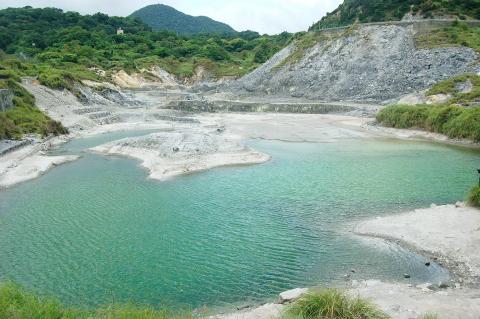Dubbed a “hot spring village,” Taipei’s Beitou District (北投) is renowned for its many hot spring hotels and resorts, mostly centered around the Xinbeitou MRT Station and Beitou Park.
The most common type of hot spring in the area is the white sulfur hot spring, which hails from the Liuhuangku Geothermal Scenic Area, a 16-hectare mountain-surrounded area southwest of the Yangmingshan National Park, followed by the blue sulfur hot springs emerging from the Thermal Valley, or Hell Valley, and iron sulfur hot springs.
According to locals, the Liuhuangku scenic area, or Sulfur Valley, was originally a mining area for sulfur minerals that were shipped mainly to China for the manufacturing of gunpowder. It was not until the Japanese colonial era that the hot springs industry flourished in the area.

Photo: Huang Chi-hao, Taipei Times
Formation of the white sulfur springs is the result of oxidation of vaporized sulfur, strata minerals on the earth’s surface, and surface water, which subsequently condenses into acidic water after making contact with cold surfaces.
The temperature of the blue sulfur hot springs from Hell Valley, which contain a wealth of sulfate minerals, can reach up to 90°C — the highest among hot springs located within the Tatun volcano group — and the spring in Beitou district is one of only two of their kind in the world.
This type of hot spring is formed by the heating of underground water by volcanic lava that mixes with surface water.

Taiwan is stepping up plans to create self-sufficient supply chains for combat drones and increase foreign orders from the US to counter China’s numerical superiority, a defense official said on Saturday. Commenting on condition of anonymity, the official said the nation’s armed forces are in agreement with US Admiral Samuel Paparo’s assessment that Taiwan’s military must be prepared to turn the nation’s waters into a “hellscape” for the Chinese People’s Liberation Army (PLA). Paparo, the commander of the US Indo-Pacific Command, reiterated the concept during a Congressional hearing in Washington on Wednesday. He first coined the term in a security conference last

DEFENSE: The National Security Bureau promised to expand communication and intelligence cooperation with global partners and enhance its strategic analytical skills China has not only increased military exercises and “gray zone” tactics against Taiwan this year, but also continues to recruit military personnel for espionage, the National Security Bureau (NSB) said yesterday in a report to the Legislative Yuan. The bureau submitted the report ahead of NSB Director-General Tsai Ming-yen’s (蔡明彥) appearance before the Foreign and National Defense Committee today. Last year, the Chinese People’s Liberation Army (PLA) conducted “Joint Sword-2024A and B” military exercises targeting Taiwan and carried out 40 combat readiness patrols, the bureau said. In addition, Chinese military aircraft entered Taiwan’s airspace 3,070 times last year, up about

A magnitude 4.3 earthquake struck eastern Taiwan's Hualien County at 8:31am today, according to the Central Weather Administration (CWA). The epicenter of the temblor was located in Hualien County, about 70.3 kilometers south southwest of Hualien County Hall, at a depth of 23.2km, according to the administration. There were no immediate reports of damage resulting from the quake. The earthquake's intensity, which gauges the actual effect of a temblor, was highest in Taitung County, where it measured 3 on Taiwan's 7-tier intensity scale. The quake also measured an intensity of 2 in Hualien and Nantou counties, the CWA said.

The Overseas Community Affairs Council (OCAC) yesterday announced a fundraising campaign to support survivors of the magnitude 7.7 earthquake that struck Myanmar on March 28, with two prayer events scheduled in Taipei and Taichung later this week. “While initial rescue operations have concluded [in Myanmar], many survivors are now facing increasingly difficult living conditions,” OCAC Minister Hsu Chia-ching (徐佳青) told a news conference in Taipei. The fundraising campaign, which runs through May 31, is focused on supporting the reconstruction of damaged overseas compatriot schools, assisting students from Myanmar in Taiwan, and providing essential items, such as drinking water, food and medical supplies,